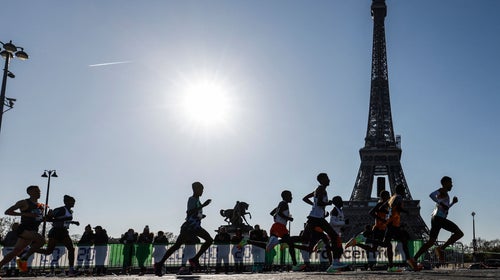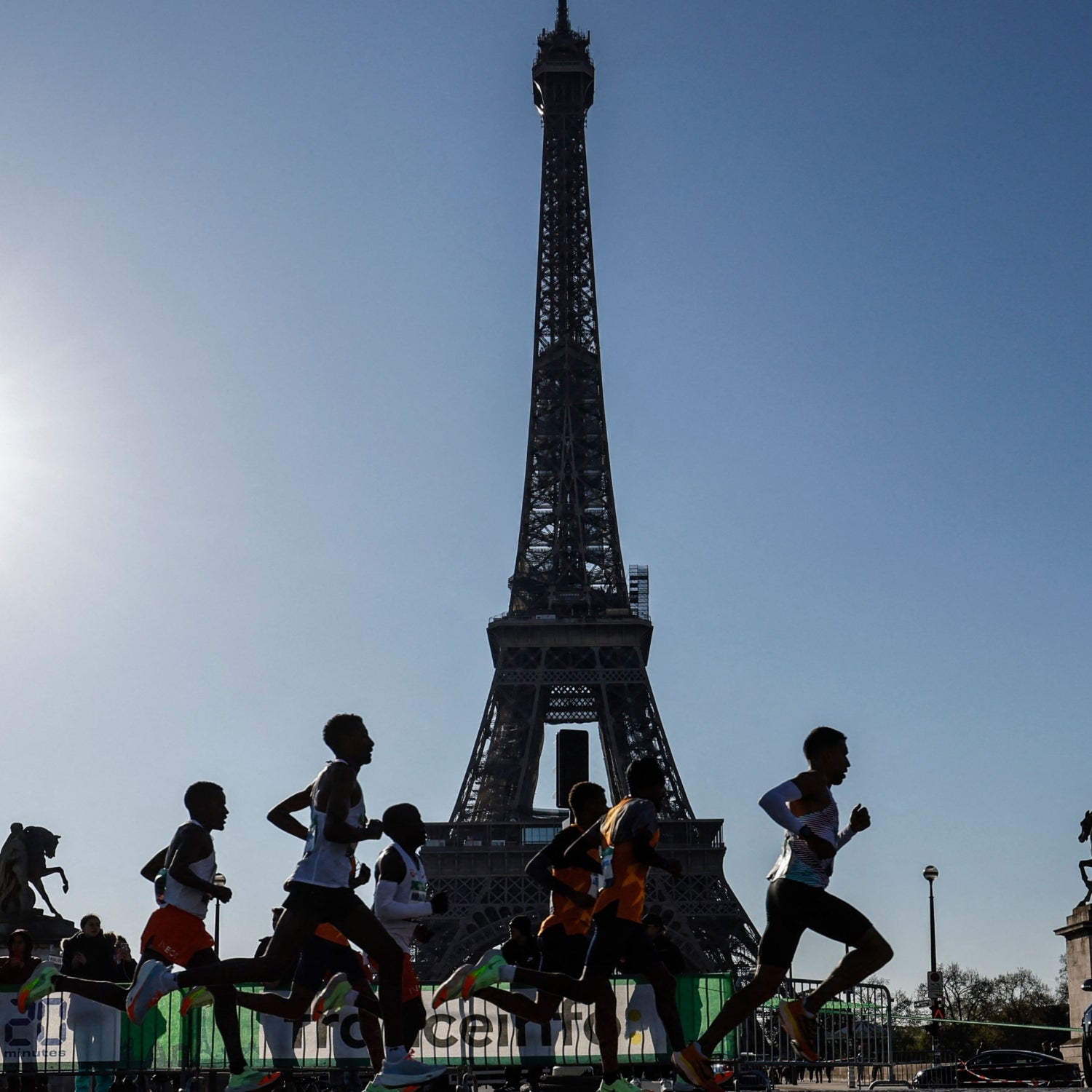In the hierarchy of extravagant running experiences, it’s hard to top the World Marathon Challenge, in which participants complete seven marathons in seven days on seven continents as they are whisked around the globe on charter flights. The sheer decadence of the event, which has an entry fee of around $40,000, would seem to make it an easy target for the growing contingent of anti-air travel activists. But presumably they have bigger fish to fry. All the better for the shameless running columnist who is always on the lookout for juicy takedown fodder.
Unfortunately, however, this particular shameless running columnist has also flown thousands of miles for running events over the last decade—either on my own dime or thanks to a Faustian invitation from a shoe brand. Hence, my eagerness to rip on the World Marathon Challenge is tempered by my own enthusiasm for long-distance travel. The German word for that enthusiasm is Fernweh—an almost painful yearning for far away places. As a chronic sufferer, I have a hard time saying no to a prospective trip—the farther away, the better. So far, this passion has been a conveniently unexamined part of life, but articles like Kate Siber’s recent piece for Outside are nudging me towards self-reflection. Thinking about flying in the context of running events seems like a good place to start.
I am part of a significant demographic of runners who are keen to travel, especially for marquee events. According to a 2022 industry survey from Running USA, 33 percent of the 5,500 runners who took part said that they were willing to travel more than 500 miles for a race. Residents of all 50 U.S. states and 105 countries took part in Monday’s Boston Marathon. Meanwhile, some competitions will explicitly incentivize long-distance travel as a marketing strategy. The World Marathon Majors touts its Six Star Medal—awarded to runners who complete Boston, New York, London, Tokyo, Berlin, and Chicago—as “marathon running’s greatest prize.” The Ultra Trail du Mont Blanc series, the behemoth of the ultra world, has official events on six continents, and uses a points system that encourages entrants to take part in as many as possible to bolster their chances of getting to compete at its flagship competition, the UTMB world finals in Chamonix.
Damian Hall, an elite British ultrarunner whose accolades include a fifth-place finish at the 2018 UTMB, is very familiar with the allure of the destination race. As a top-level competitor, he has received invites to sufferfests all over the world. Until 2019, he thought little of jetting off three to five times a year to compete, but the emergence of climate activist groups like the UK-based Extinction Rebellion led him to be more conscientious about the most carbon-heavy aspect of his hobby. He began to focus more on FKTs and local events. He co-founded an organization dedicated to making recreational running a more sustainable activity and published a book on the same topic. When I spoke to him, Hall had recently taken his first flight in four years to compete in this year’s Barkley Marathons—an event he’d long been waitlisted for and ultimately couldn’t resist.
“I do think some flights are more justifiable than others,” Hall told me when I asked him whether he thought there was an ethical hierarchy when assessing whether to fly for recreational purposes. These days, when weighing whether to commit to a race that is far afield, Hall says that he begins by asking himself: How important is this really? and Is there a better way to travel to this race than to fly? (As Hall points out, the benefit of living in the UK is that the grand European summer ultra circuit, including the UTMB, is accessible by rail.) “I recently received an invitation to a race in Bhutan that was hard to turn down,” Hall says. “It seemed like a very unique experience that would have been more justifiable to accept, but because it was a new race and not some legendary event that I’ve always wanted to do, I couldn’t quite bring myself to do it.”
As someone who has gone on transatlantic press trips for the noble purpose of learning about new running shoes, this sort of idealism tends to put me on edge. I think some of us tend to sneer at environmental do-gooders because we subconsciously regard their behavior as an indirect judgment of our own apathy. Earlier this year, the running phenom Innes Fitzgerald, who recently broke the British women’s under-17 record in the 3000-meters, made headlines for declining an invitation to compete in the World Cross Country Championships in Australia. As Fitzgerald put it in a letter to British Athletics, the opportunity didn’t outweigh “the grief she would feel for taking the flight.” Cue the article in The Daily Mail which dubbed Fitzgerald the “Greta Thunberg of sport” and the attendant wave of comment section cynicism.
At the elite and professional level, international travel is unavoidable if you want to make a living in the sport. Ben Blankenship, who competed for the U.S. at the 2016 Olympics in Rio, is one of a number of elite athletes who has a recent track record of environmental activism. When I asked him whether pro runners were more justified in flying to races since they were doing so to earn a living as opposed to showing off on Strava, he demurred. “I think anyone thinking they ‘deserve’ something over somebody else is probably not the most productive train of thought,” Blankenship told me, adding that figuring out how to lessen our individual and collective carbon impacts and moving towards a more sustainable model is the way to go.
I’m tempted to embrace any answer that frames my individual actions as minimally significant in the face of larger structural forces. (Tell me if you’ve heard that one before.) But of course, the absence of an immaculate rationale on air travel doesn’t imply that everything is permitted any more than it mandates that none of us should ever get on a plane again. Unlike surfing or skiing, recreational running isn’t really limited by geographical constraints. You can pretty much do it anywhere.
Does that make flying to destination races somehow less OK than, say, hopping on a jet to fly across the country to ski Utah powder? I put that question to Sabrina Little, an elite trail and ultrarunner, columnist for irunfar.com, and philosophy professor at Morehead State University.
“I would like to give you a precise principle for how to weigh travel, but I do not think the ethical calculus here can be that precise.” Little told me via email. “Some people live for destination skiing or World Marathon Majors and see them as once-in-a-lifetime trips. Should we all do them? Probably not.”
Although Little says that when people explicitly ask her for advice on traveling, her standard answer is: “Do less than you are doing now,” she is wary of being prescriptive about an endlessly multifaceted decision: “I am not going to claim that some kinds of travel are okay and others are not because I do not know the context of the travel, the importance, or how a person stewards the planet the rest of their days.”
For his part, Hall echoed this point when he suggested that a person’s “carbon shadow,” which assesses environmental impact on a holistic basis, is ultimately more relevant than their individual footprint. In the grand scheme of things, the climate scientist who regularly flies to conferences dedicated to lowering emissions is doing more good than the oil company executive who walks to work in the morning. In other words, it’s a waste of time to engage in endless handwringing about perfect ideological consistency. On his Instagram, Hall identifies as a “climate emergency hypocrite.” By embracing his own inevitable hypocrisy, fretting over it won’t prevent him from striving to do the right thing.
“Athletes are some of the most influential people there are, but I think many of them are silent on this issue because, obviously, international sport nearly always involves international travel,” Hall says. “But if they stay quiet, nothing happens, so what good is that?”

